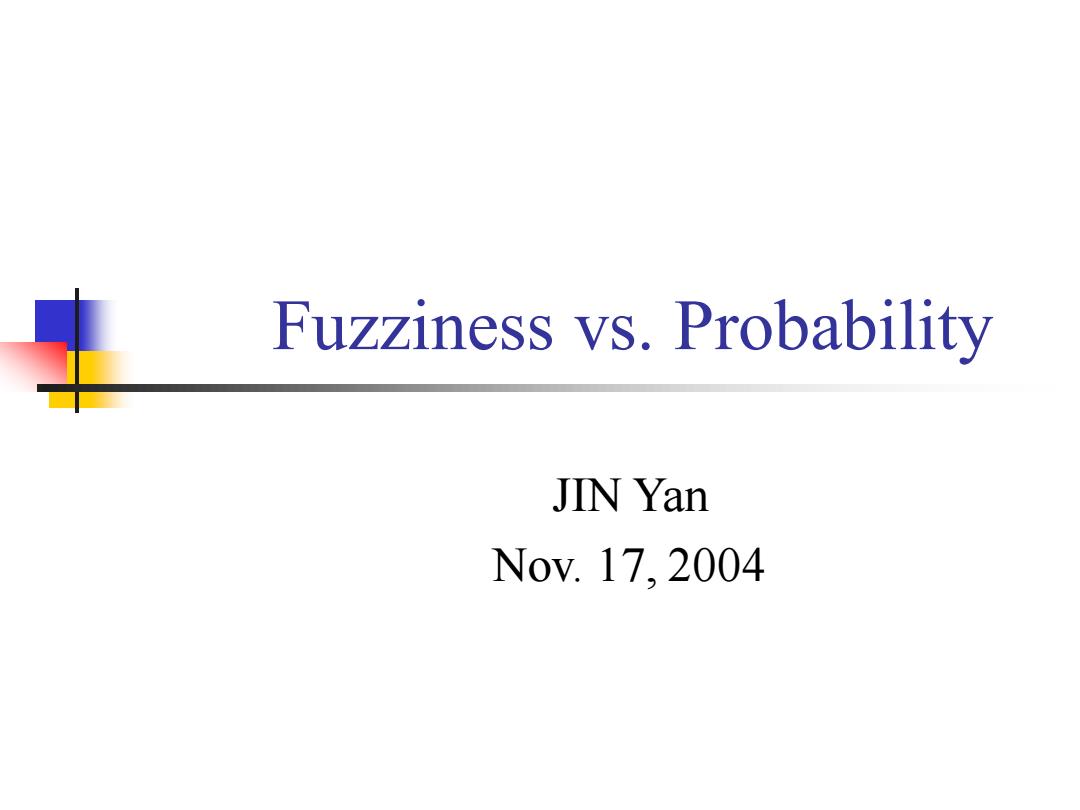
Fuzziness vs.Probability JIN Yan Nov.17,2004
Fuzziness vs. Probability JIN Yan Nov. 17, 2004
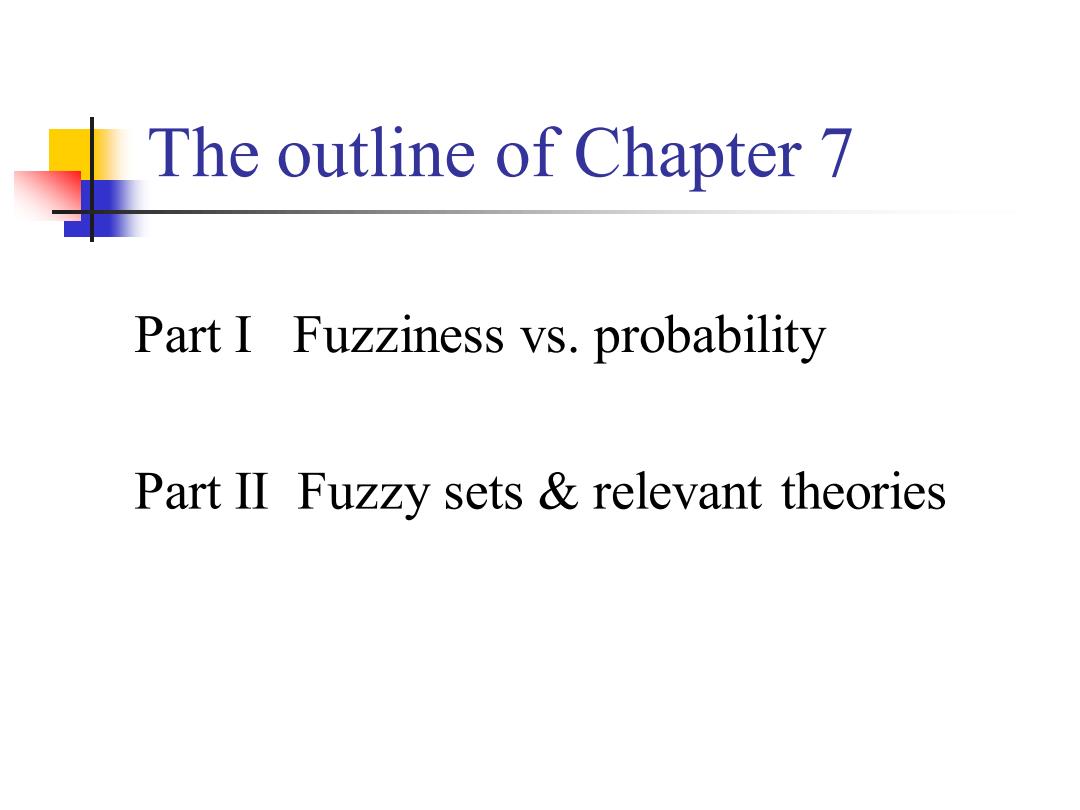
The outline of Chapter 7 Part I Fuzziness vs.probability Part II Fuzzy sets relevant theories
The outline of Chapter 7 Part I Fuzziness vs. probability Part II Fuzzy sets & relevant theories
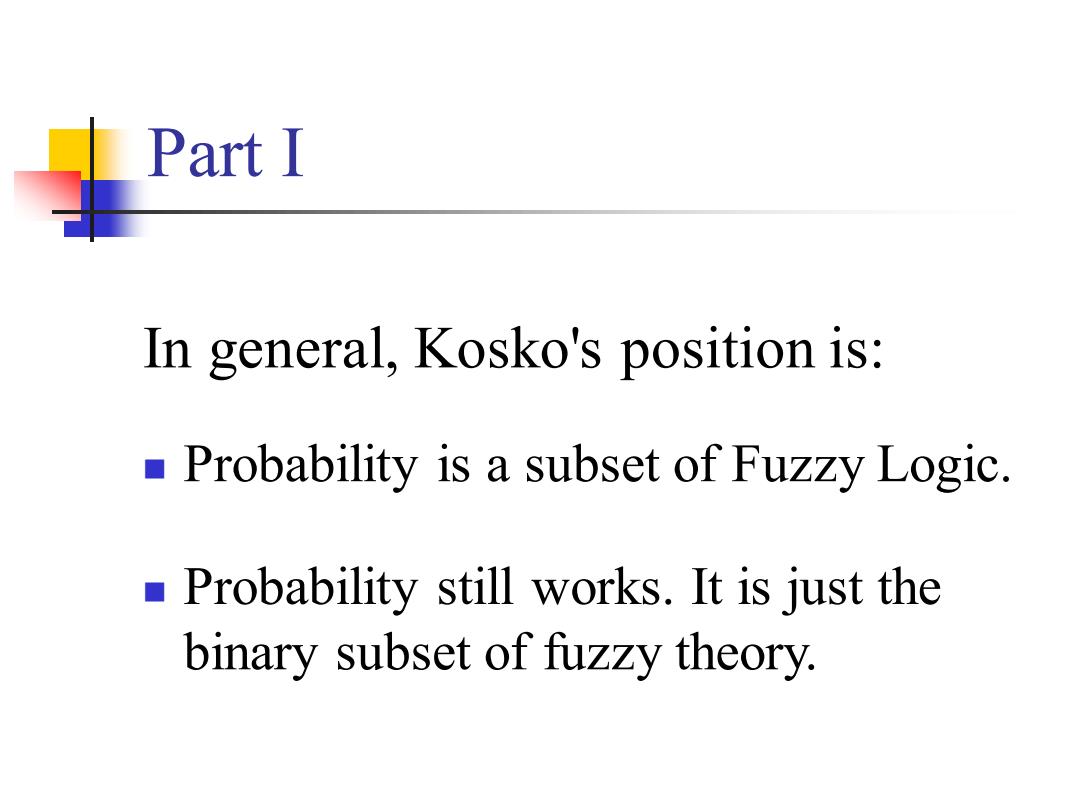
Part I In general,Kosko's position is: Probability is a subset of Fuzzy Logic. Probability still works.It is just the binary subset of fuzzy theory
Part I In general, Kosko's position is: ◼ Probability is a subset of Fuzzy Logic. ◼ Probability still works. It is just the binary subset of fuzzy theory

Fuzziness in a probabilistic World Uncertainty-how to describe this notion in math? Probability is the only answer probabilists hold this.) 。Fuzziness. (probability describes randomness, but randomness doesn't equal uncertainty.Fuzziness can describe those ambiguous phenomena which are also uncertainty.)
Fuzziness in a Probabilistic World Uncertainty—how to describe this notion in math? ⚫ Probability is the only answer ( probabilists hold this.) ⚫ Fuzziness. (probability describes randomness, but randomness doesn’t equal uncertainty. Fuzziness can describe those ambiguous phenomena which are also uncertainty.)
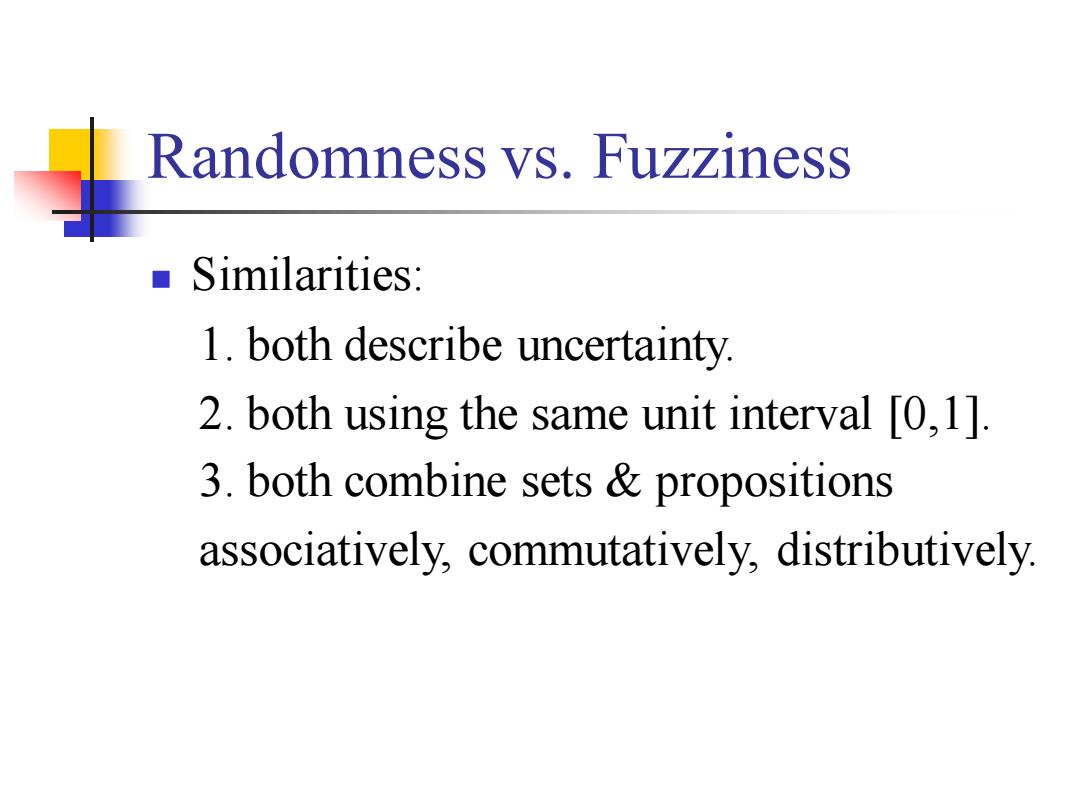
Randomness ys.Fuzziness Similarities: 1.both describe uncertainty. 2.both using the same unit interval [0,1] 3.both combine sets propositions associatively,commutatively,distributively
Randomness vs. Fuzziness ◼ Similarities: 1. both describe uncertainty. 2. both using the same unit interval [0,1]. 3. both combine sets & propositions associatively, commutatively, distributively

Randomness vs.Fuzziness ■Distinctions: Fuzziness event ambiguity Randomness whether an event occurs. How to treat a set 4 its opposite 4(key one). Probability is an objective characteristic Fuzziness is subjective. The last viewpoint comes from "Fuzziness versus probability again",F.Jurkovic
Randomness vs. Fuzziness ◼ Distinctions: ➢ Fuzziness event ambiguity. Randomness whether an event occurs. ➢ How to treat a set A & its opposite Ac ( key one). ➢ Probability is an objective characteristic Fuzziness is subjective. ( The last viewpoint comes from “Fuzziness versus probability again”, F. Jurkovič )
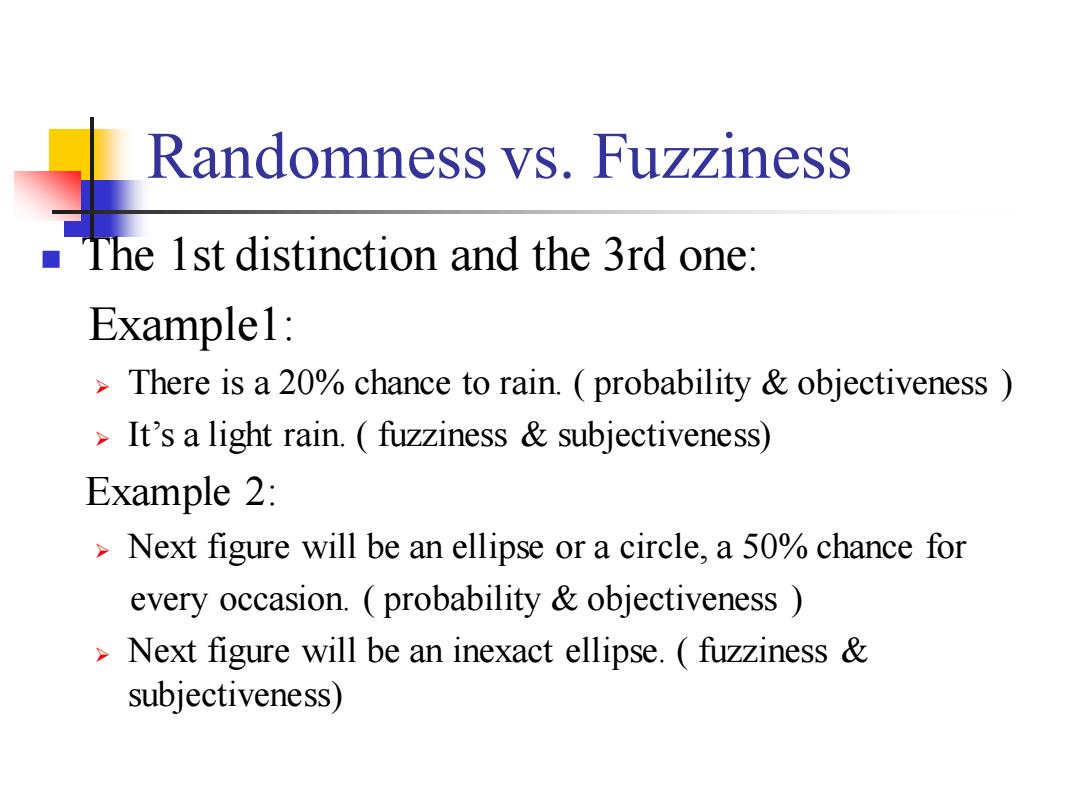
Randomness vs.Fuzziness The 1st distinction and the 3rd one: Examplel: There is a 20%chance to rain.probability objectiveness It's a light rain.fuzziness subjectiveness) Example 2: Next figure will be an ellipse or a circle,a 50%chance for every occasion.probability objectiveness Next figure will be an inexact ellipse.fuzziness subjectiveness)
Randomness vs. Fuzziness ◼ The 1st distinction and the 3rd one: Example1: ➢ There is a 20% chance to rain. ( probability & objectiveness ) ➢ It’s a light rain. ( fuzziness & subjectiveness) Example 2: ➢ Next figure will be an ellipse or a circle, a 50% chance for every occasion. ( probability & objectiveness ) ➢ Next figure will be an inexact ellipse. ( fuzziness & subjectiveness)

or An inexact ellipse
or An inexact ellipse

Randomness vs.Fuzziness The key distinction: IsA∩A=always true? The formula describes the law of excluded middle --white or black. Yet how about those "a bit white a bit black' events?----Fuzziness!
Randomness vs. Fuzziness ◼ The key distinction: Is always true ? c A A = The formula describes the law of excluded middle --- white or black. Yet how about those “a bit white & a bit black” events? ---- Fuzziness!!
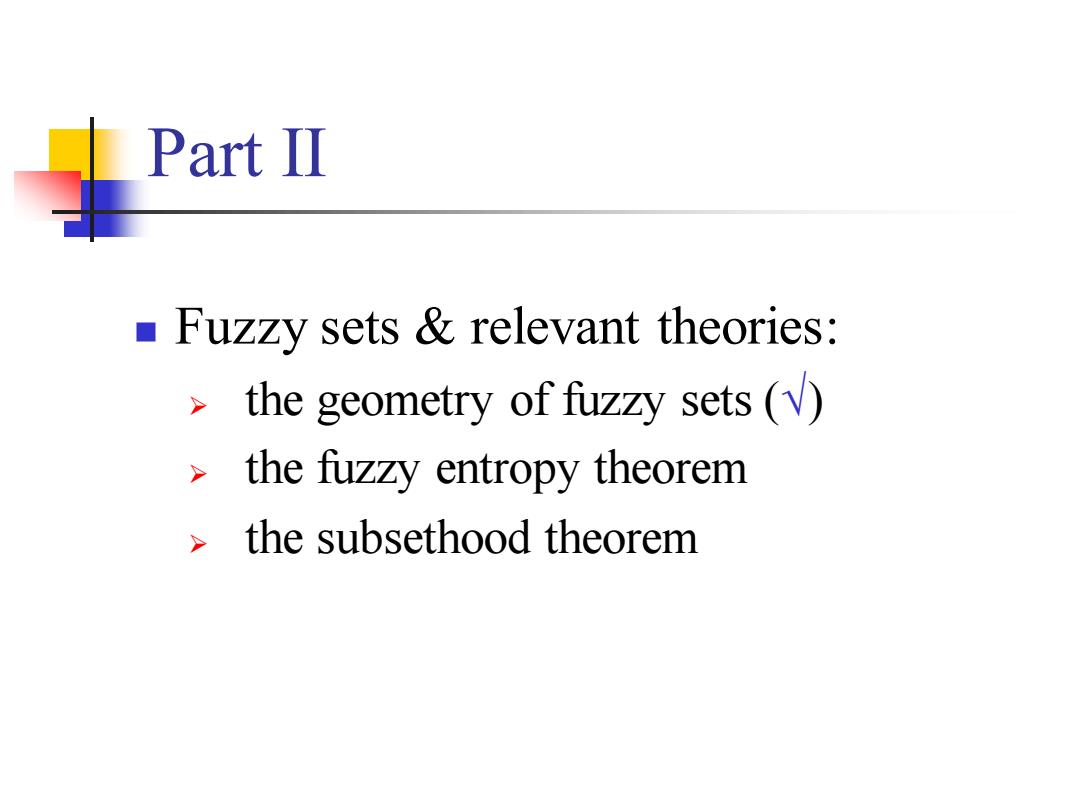
Part I Fuzzy sets relevant theories: > the geometry of fuzzy sets() the fuzzy entropy theorem the subsethood theorem
Part II ◼ Fuzzy sets & relevant theories: ➢ the geometry of fuzzy sets (√) ➢ the fuzzy entropy theorem ➢ the subsethood theorem